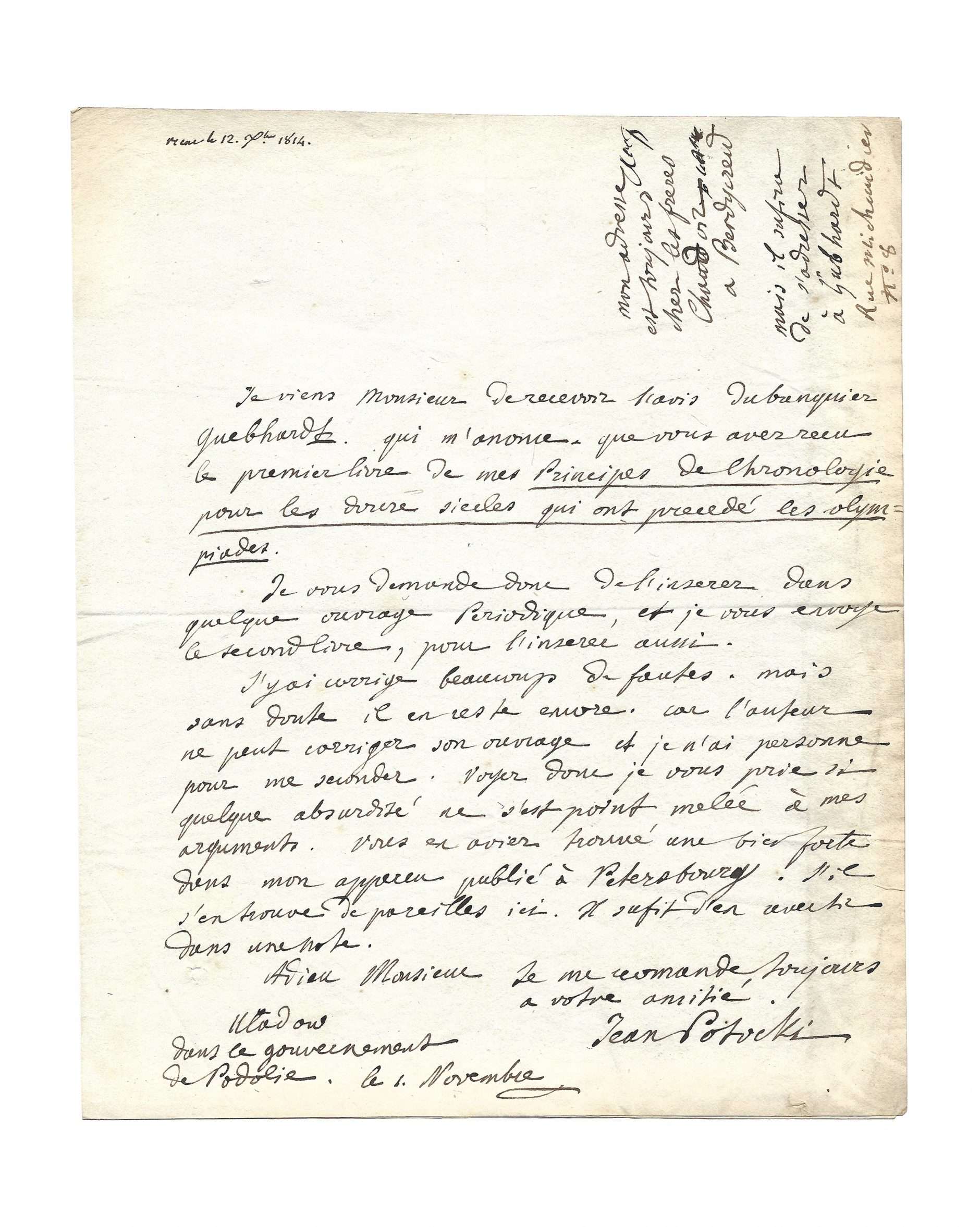POTOCKI, Jan (1761-1815)
Autograph letter signed “Jean Potocki” to Firmin Didot
Uladowka, 1st November [1814], 1 p. in-4
“You have received the first book of my Principles of Chronology for the Twelve Centuries Leading Up to the Olympiads”
Fact sheet
POTOCKI, Jan (1761-1815)
Autograph letter signed “Jean Potocki” to Firmin Didot
Uladowka, 1st November [1814], 1 p. in-4to on double folio
Usual fold marks, turned slightly brownish on right hand margin, tiny hole on lower right margin
Extremely scarce and last known letter of the author of The Manuscript Found in Saragossa, a year before committing suicide
One of the last two letters of Potocki in private hands
“Je viens Monsieur de recevoir l’avis du banquier Guebhardt, qui m’anonce, que vous avez recu le premier livre de mes Principes de Chronologie pour les douze siècles qui ont précédé les olympiades.
Je vous demande donc de l’inserer dans quelque ouvrage Periodique, et je vous envoye le second livre, pour l’inserer aussi.
J’y ai corrige beaucoup de fautes, mais sans doute il en reste encore, car l’auteur ne peut corriger son ouvrage et je n’ai personne pour me seconder. Voyez donc je vous prie si quelque absurdité ne s’est point melée à mes arguments. Vous en aviez trouvé une bien forte dans mon appercu publié à Petersbourg. S’il s’en trouve de pareilles ici. Il sufit d’en avertir dans une note.
Adieu Monsieur Je me r[e]comande toujours à votre amitié. Jean Potocki.
Uladow / dans le gouvernement / de Podolie. Le 1. Novembre
Mon adresse est toujours chez les freres Chaudoir, a Berdyczew mais il sufira de s’adresser à Gebhardt Rue Michaudier[e] N°8″
An eclectic figure whose talent is not limited to literary qualities, Potocki’s many travels have made him a historian, archaeologist, geopolitical scientist, ethnologist and linguist.: The Archaeological Atlas of European Russia (1797-1805) and The Manuscript Found in Saragossa (three published versions between 1794 and 1810).
The Atlas is similar to what we now call a historical atlas, the historical and geopolitical evolution of a geographical area in the context of maps. Potocki sees this project as an ultimate goal.
Manuscript is a novel as eclectic as its author. There interfere with libertine, Gothic, picaresque novels, all nourished by philosophical reflections. The book also includes mathematics: the character of Velasquez is interested – albeit sarcastically – in statistical laws concerning the length of reigns (these studies are also part of chronography).
Jean Potocki : Chronograph
The chronology of antiquity appears as a logical continuation of his research as a historian of Antiquity and his scholarly readings. To find his way around, Jean Potocki needs to deal with synchronicity: these are his “cyclographic maps”, and diachrony: it will be his “chronologies”, which will constitute the essence of his research, once installed in his studious and solitary retreat of Uladowka. It was from 1803 that he undertook a new work on the chronology of the ancient periods: Principles of chronology for times prior to the Olympiads (six volumes published between 1813 à 1815) which the presented letter refers to.
References: Jean Potocki, Œuvres V, éd. François Rosset & Dominique Triaire, Peeters, p. 264 – 265
